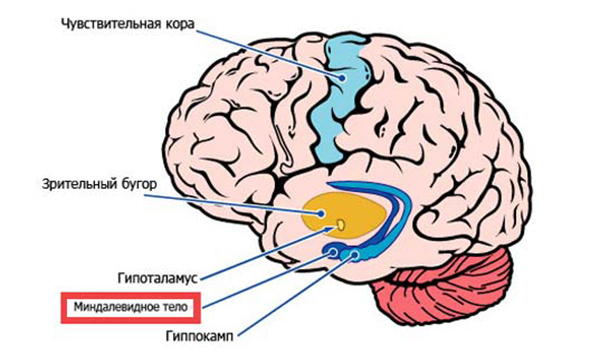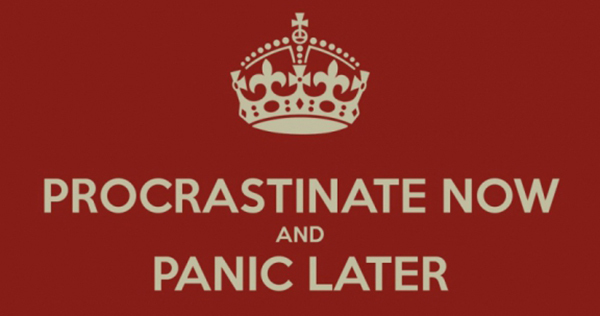What happens to our brain during procrastination?

Who today does not know about procrastination? Absolutely each of us is inherent in the rubber (of course, on different scales, some achieve perfection in this skill). Does this apply to you? Then you are superman, and this article is not for you (but I promise to tell you about curious things).
Almost everyone is struggling with this phenomenon, there are many well-advertised techniques that are designed to help us in this difficult task, but basically they all look like most modern medicines: they treat symptoms, not the very cause of the disease. In order to reduce the level of procrastination, you need to understand what processes in our mind it is caused. We have already talked about how our brain reacts to multitasking. Now let's look at the role of the impulses sent to them in our procrastination.
Procrastination: what is it?
Wikipedia defines procrastination as "the propensity to permanently postpone important and urgent matters, leading to life problems and painful psychological effects." If you dig deeper, then from a psychological point of view, this is connected with the problems of human self-control: we take actions that immediately bring us satisfaction in order to avoid the task for which we are afraid to undertake or which seems boring to us.
')
Let's look at this with an example. On a personal example. I like to run in the morning. In the evening I am 100% ready to get up early to run. But when it comes time to get up, the pillow attracts much more than the future "sporting achievements". And I know perfectly well that I will later regret and reproach myself, but the prospect that in an hour I will receive my reward in the form of soul and body songs seems much less attractive than the continuation of a sweet slumber here and now. Such advantages as the positive effect of running on health in those moments are not even remembered. Familiar with this?

You will be a great nekhochuhoy!
At the neurobiological level, constant delays are caused by emotions, which are based on the inner desire to protect themselves from negative feelings associated with the fear of failure. Life is not devoid of irony - procrastination drives us into those networks from which we subconsciously try to escape.
What happens to our brain when we paint?
The human body is a terrific lab. Hormones control our emotions and actions. We are simply addicted to dopamine, a hormone that is produced as a result of pleasant experiences. Our brain is aware of the actions that in the past have led to the production of dopamine, and seeks to repeat them. If one task promises to stimulate a higher level of this hormone than another, then the brain will cling to the performance of the first kind of activity, avoiding other less pleasant actions.
In the brain of a person (and not only of a person) there is an area that plays an important role in the appearance of procrastination. This amygdala, or amygdala, got its name because of its characteristic shape. She is responsible for automatic emotional reactions to the situation, that is, she takes part in the formation of emotions, including feelings of fear and pleasure. The amygdala is involved in the formation of memories and the decision-making process, and can also cause various psychological disorders, including phobias.

When you are worried about a huge number of tasks or difficult work to be tackled, the amygdala provokes a fight (resistance) or retreat (ignore) reaction, being one of the ancient self-preservation tools of homo sapiens and trying to protect us from feelings of panic, depression and uncertainty to myself. When she recognizes anxiety signals, the level of adrenaline in the blood increases.
In turn, adrenaline dulls the work of those areas of the brain that are responsible for planning and logical thinking. So the power is captured by those brain structures that are “prone” to greater spontaneity. So it turns out that instead of doing a project that we will be proud of in the future or for which we will receive a reward, we are considering cats on Pinterest.

Our brain is intoxicated with the possibility of immediately receiving another dose of dopamine - and with the logic turned off, it takes its toll.
How to deal with this opponent?
Throw him the results of research!
Back in 1925, in her diploma work, the future founder of Soviet pathopsychology Blum Vulfovna Zeigarnik discovered an interesting feature of the human brain: we better remember exactly those things that we have already partially done. Zeigarnik found that people are able to tell twice more details about the tasks for which they were interrupted, rather than about the completed actions. In addition, the memories of projects that are not revealed until the end remain in memory for much longer (and they will haunt us, you add).
Then Kurt Lewin in his experiments showed that at the beginning of work on a specific task, tension arises, which does not disappear completely if we interrupt the work we are engaged in. It helps us better remember the unfinished action - and we strive to continue working on what we did not finish in order to realize the rest of the potential and get rid of this tension. 90% (!) Of children who participated in his experiment, sought to complete their begun creative work, even if they were distracted and offered another occupation.
In studies conducted by psychology teacher Kenneth McGraw, people involved in the experiment were given challenging puzzles, and their solution was given an "unlimited" amount of time. Before the puzzles were completed, they were told that the experiment was already finished, and they could go home if they wished. And what do you think they did? All the same 90% of the participants continued to collect the puzzle, trying to complete the started task.
How to apply this in the fight against procrastination?
Just start
It's simple. As our grandmothers and grandfathers said, the main thing is to start, and then it goes on its own (here you and the proverbial wisdom always marks the bull's eye, and no science is needed).
All the above studies tell us that if a person has reached the task and started working on it, then the chances that he will not forget about it and complete the work he has begun will increase dramatically.
Therefore, based on scientific achievements and the “wisdom of the ancients,” you can derive a formula for successfully combating procrostination: just start the work you don’t want to undertake and which you postpone for later. It is not necessary to start from the very beginning - start from anywhere. Just do it! And you don’t need to suffer perfectionism: it’s still better to do the job well, but now than perfect, but never. Can't get up normally in the morning? No need to give yourself "another 5 minutes" to lie in bed - just get up and do not waste time on "thinking." I know it can be hard, especially when the prospect of jogging is ahead. But in 15 minutes it will be easier for you - your brain will find other sources of dopamine's favorite: a fragrant coffee, a contrast shower, a favorite book.
In the fight against procrastination, motivation is very important. Think of it as a promise of another portion of dopamine to your stubborn brain. Of course, such an approach requires willpower, and very often you will not get by with one carrot. When I really do not want to do something, then I “take the rod” and just say to myself: “Do you want to read a book (do your favorite hobby, take a walk, do another more pleasant job)? Then complete this project, and you will have the desired reward! ”The more I play the fool and I pull rubber, the less I have time for my favorite activities - it motivates.
Cheat your brain
Our brain plays cat and mouse with us, provoking what we think only about the most difficult moments of work, scrolling through the worst scenarios. He is able to present our tasks in such a light that they simply swell in size and it seems that their fulfillment will take forever. As our brain tries to “ease” our lives and protect us from difficult work, it fools us, including an “action simulator” and giving us hundreds of small, useless tasks to create a feeling of being busy.
When I was looking for techniques to combat procrastination, I came across a very interesting idea. Create a list of your global goals and present it as small tasks. For example, if you are aiming for a healthy diet and losing weight, then reduce it to "drink a glass of water, eat an apple." If you want to write a book - specify in to-do that you need to write 2 pages (or even less). Want to start running? Do not write what you have to do a half-hour run - limit yourself to “put on your sneakers and go outside”. And you will find that now your goals don't seem so ambitious to you. You are already in sneakers, right? So why not go for a run?
There are many ways to combat procrastination - from various trainings to web services and classes with a personal coach. Pay attention to our goal achievement service - SmartProgress . We created it with the belief that it could be a faithful helper for users to set and achieve goals. As you already understood, the main thing is to set a task and take the first step. This is the most important part of the job. When the first step is made, then it will be much easier for you to reach your goal. As soon as you cope with a tiny fraction of your huge task, your brain will begin to work "in the other direction", wishing to complete what has been started.

The creators of the SmartProgress service were guided by the idea that it would help people not only to set tasks for themselves, but also to successfully bring what they had started to the end, motivating them to new achievements. We very much hope that thanks to our article you have understood better what procrastination is caused by, and now you will be able to deal more productively with this ailment, and our team is always glad to come to the rescue in this difficult task. Set goals and go to them! Good luck!
I recommend my other posts from our blog:
GTD in English (and not only): a new look at learning foreign languages
Psychology of setting goals: is it worth telling others about them?
Parable about how the technique Pomodoro saved the inveterate workaholic
Source: https://habr.com/ru/post/295406/
All Articles